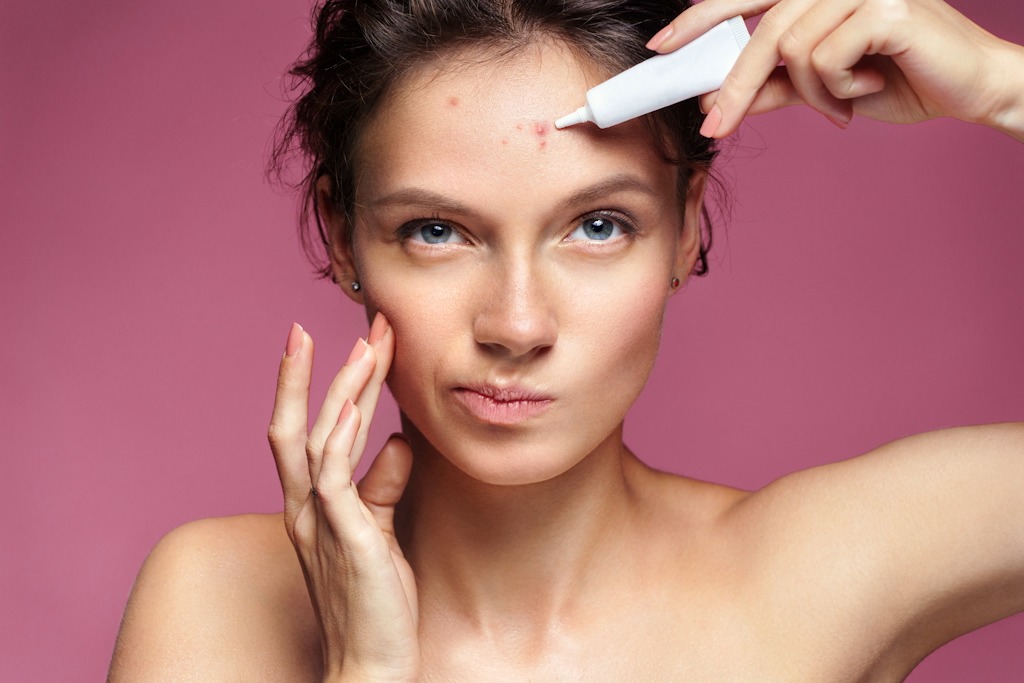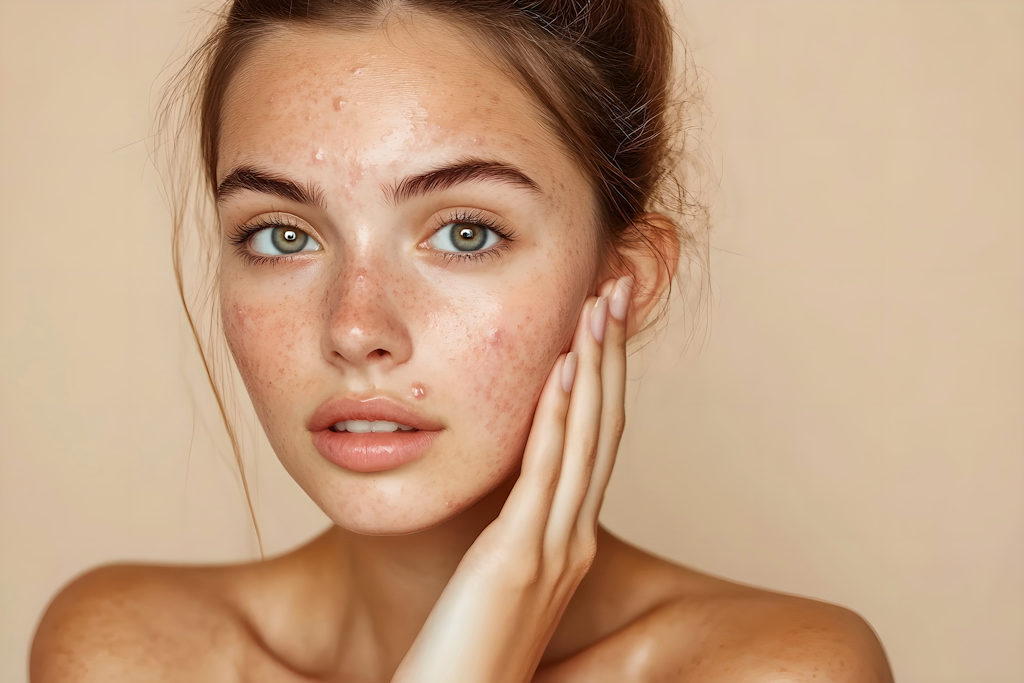Acne: causes, care and the right treatment
- What is acne - and how does it develop?
- Factors influencing the development and worsening of acne
- Maskne and summer acne - similar causes, different triggers
- Localization: What skin blemishes reveal about their cause
- Treating acne: The right way to deal with inflamed skin
- Professional treatment options in the studio
- Nutrition and skin - what science says
- Summary: A holistic view of acne - and targeted treatment

Acne is one of the most common skin conditions of all - not only in adolescents, but also in adults. While many people perceive acne primarily as a cosmetic problem, it is a complex, inflammatory skin disease that needs to be classified both medically and cosmetically. It can have different causes and manifestations - from mild blackheads to painful cysts or hormonally induced acne.
In this article, we would like to look at the topic of acne: from the biological basis to typical triggers and treatment options - both in home care and as part of cosmetic treatments. The latest dermatological findings as well as practical experience from our Munich salon will be included.
What is acne - and how does it develop?
Acne (medically: acne vulgaris) is a disease of the sebaceous gland follicles. It occurs when sebum, dead skin cells and bacteria accumulate in the pores. The result is comedones (blackheads), inflammatory papules, pustules or deeper nodules and cysts.
The four main causes of acne:
- Seborrhea (excessive sebum production):
Under the influence of hormones (especially androgens), the sebaceous glands produce more skin oil (sebum). - Hyperkeratosis (keratinization disorder):
The skin cells in the follicles are not shed properly, which closes the pores. - Colonization with Cutibacterium acnes (formerly Propionibacterium acnes):
This bacterium breaks down sebum and triggers inflammatory reactions. - Inflammatory processes:
The immune system reacts to the bacteria and follicle contents with local inflammation.
Factors influencing the development and worsening of acne
In addition to the direct causes, there are a number of factors that can promote or worsen acne. These include, among others:
- Hormonal changes: e.g. during puberty, the menstrual cycle, pregnancy or hormonal contraceptive methods.
- Stress: increases the stress hormone cortisol, which in turn stimulates sebum production.
- Diet: especially foods with a high glycemic index (e.g. sugar, white flour) or certain dairy products.
- Medication: some preparations (e.g. cortisone, anabolic steroids) can cause or worsen acne.
- Cosmetic products: comedogenic ingredients in particular can also clog pores.
- Climate and textiles: Sweat, friction or a warm and humid climate (e.g. under masks) promote bacterial activity.
Maskne and summer acne - similar causes, different triggers
A relatively new term is "maskne" - a form of acne caused by the regular wearing of face masks. It is mainly observed in the medical and cosmetic professions, but also affects people who wear masks in everyday life - for example when traveling, on public transport or in crowded indoor spaces.
Our beautician's expert opinion:
"Maskne is basically the same as so-called summer acne - both are favored by a moist, warm skin environment that closes the pores and promotes inflammatory processes."
Under the mask, breathing air, sweat and friction create a microclimate that weakens the skin barrier, clogs pores and accelerates bacterial activity. The skin appears stressed and reacts with pustules, papules and feelings of tightness - especially on the cheeks, chin and nose.
Summer acne occurs under similar conditions: high temperatures, humidity, UV radiation and increased sweating also lead to a skin environment that favors inflammatory processes.

Localization: What skin blemishes reveal about their cause
The distribution of acne can provide clues as to its cause. In our salon, we have been working with so-called zone analyses for years in order to develop individual care approaches.
- Forehead - stress, hormonal imbalances, styling products
- Chin & jaw - Cycle-related or hormonal acne
- Cheeks - mask friction, bacterial load, make-up
- Back/chest - sweat, friction from clothing, training
Treating acne: The right way to deal with inflamed skin
A well-thought-out skincare plan helps to stabilize the skin's appearance in the long term. The following applies: less is often more. Over-care, aggressive peelings or irritating products can further damage the skin barrier.
Our 4-step recommendation:
- Cleansing - pH-neutral, alcohol-free cleansing in the morning and evening - e.g. with a mild gel or foam.
- Peeling - once a week a chemical peeling with BHA (salicylic acid) or AHA (e.g. mandelic acid) - avoid mechanical peelings.
- Moisturizer - Non-comedogenic gel creams or serums with ingredients such as niacinamide, zinc PCA or panthenol.
- Sun protection - Daily UV protection with SPF 30+ - even in cloudy weather. UV radiation increases inflammation and promotes pigmentation spots.
Additional active ingredients such as azelaic acid or retinal (vitamin A) can have a supportive effect - preferably after consultation with specialist staff.
Professional treatment options in the studio
In our salon, we offer targeted treatments that are tailored to the respective skin needs:
- Slightly oily skin - Clean your skin - Manual cleansing + detox mask
- Hormonal acne - Hydra Memory - Fruit acid peel 4
- Sensitive skin - Facial Treatment Sensitive - Soothing mask + moisturizing serum
- Maskne / summer acne - one of the above treatments depending on skin type and requirements
Our treatments always start with a professional skin analysis and are individually adapted to the current skin condition.
Nutrition and skin - what science says
Several studies have shown that certain diets can influence the appearance of the skin - although not to the same extent for everyone:
- Diets high in sugar (high glycemic index) can promote inflammation.
- Dairy products (especially low-fat) are suspected of promoting acne in certain people.
- Probiotics and a gut-healthy diet show potentially positive effects in recent studies
Summary: A holistic view of acne - and targeted treatment
Acne is not a trivial matter, but an expression of internal and external influences. Treating it requires not only patience, but also the right understanding of skin physiology, care products and lifestyle factors.
In contrast to pure cosmetic advice, at Salon Sandra von Gneisenau we offer well-founded skin analyses, individually tailored treatment plans and long-term support. Especially in more complex cases such as hormonal acne, maskne or sensitive skin, professional coordination is crucial.
Advice & appointments
If you would like to understand your skin better and receive targeted support, we cordially invite you to consult us. Our experienced skin experts will take time for you - whether for classic acne treatment or home care advice.
References
- Reynolds RV, Zaenglein AL, et al. Guidelines of care for the management of acne vulgaris. J Am Acad Dermatol. 2024 (AAD guideline, topicals/systemics & good practice, incl. photoprotection). Link: https://www.jaad.org/article/S0190-9622%2823%2903389-3/fulltext
- Teo WL. Diagnostic and management considerations for "maskne" in the era of COVID-19. J Am Acad Dermatol. 2021;84(2):520-521. Clinical criteria for maskne (acne mechanica). PubMed: https://pubmed.ncbi.nlm.nih.gov/33011321/
- Korting HC, et al. The influence of the regular use of a soap or an acidic syndet bar in acne-prone skin (RCT). Acta Derm Venereol. 1995;75(6):449-451. PubMed: https://pubmed.ncbi.nlm.nih.gov/7622270/
- Chen X, Wang S, et al. Chemical peels for acne vulgaris: a systematic review of randomized controlled trials. BMJ Open. 2018;8:e019607. Full text: https://bmjopen.bmj.com/content/8/4/e019607
- Shalita AR, et al. Topical 4% nicotinamide vs. 1% clindamycin in inflammatory acne (randomized, double-blind). Int J Dermatol. 1995;34(6):434-437. PubMed: https://pubmed.ncbi.nlm.nih.gov/7657446/
- SmithRN, et al. A low-glycemic-load diet improves symptoms in acne vulgaris patients: a randomized controlled trial. Am J Clin Nutr. 2007;86(1):107-115. PubMed: https://pubmed.ncbi.nlm.nih.gov/17616769/
- AghasiM, et al. Dairy intake and acne development: Meta-analysis. Clin Nutr. 2019;38(1):106-114. PubMed: https://pubmed.ncbi.nlm.nih.gov/29778512/
- LinHW, et al. Efficacy of oral probiotics in patients with acne: Systematic review & meta-analysis of randomized trials. Clin Exp Dermatol. 2025; online ahead of print. PubMed: https://pubmed.ncbi.nlm.nih.gov/40832719/
About the author

Sandra von Gneisenau
Sandra, the founder of Sandra von Gneisenau Salon, sees professional expertise with a special flair for the individual as one of the core aspects of the trade in her role as managing director and stylist. Early in her career, she acquired her master's degree and took on management positions in the exclusive salons in Munich. Her work with clients from Germany and abroad has shaped her understanding of quality and customer focus. Her clients include national and international celebrities, including well-known personalities from film, television, social media and public life, who come to her for her expertise, discretion and confidence in her abilities. Her training and practical experience enable her to work at the highest level and to precisely grasp and implement her clients' wishes. In her articles, she offers deep insights into her professional expertise and her experiences with a wide range of clients, which makes her a sound consultant in the field of beauty and personal style development.
More information about Sandra and her career can be found here
About Sandra
Weattach great importance to the quality and authenticity of our articles. Find out more about how we create our content and ensure that it is based on sound expert knowledge:
Our transparency notes
Share article
.svg)
.svg)
.svg)
.svg)
.svg)



.svg)